-
Home
- ISO 37001:2016
All Categories
- ISO 9001:2015
- IAF Register
- Organic certification
- ISO 14001:2015
- OHSAS 18001:2007
- ISO 27001:2013
- ISO 13485:2016
- ISO 50001-2011
- CE Marking
- ISO 15000 HACCP
- ISO 29990:2010
- ISO 22301-2012
- Lead Auditor Training
- ISO 29993:2017 Certification
- Other Services
- HSE MS
Quick Links
- About us
- CE Marking Certification
- Impartiality Statement
- Founder
- Quality Policy
- ISO Application Process
- Certified Client
- Accredited Certificate Need to be Converted
- History
Quick Links
- About us
- CE Marking Certification
- Impartiality Statement
- Founder
- Quality Policy
- ISO Application Process
- Certified Client
- Accredited Certificate Need to be Converted
- History
- CE Notified Body
- ISO 10002
- ISO 50001
- Low Voltage CE
- Responsible Care Management System
- IFS Food
- Global GAP
- Code of Integrity
- Use of Marks
- Key Elements of BCMS
- IAF Register of Accredited Certificate
- What are Key Documents required for Client as per ISO?
- IAF Register
Read More
ISO 37001:2016

Overview of ISO 37001:2016 Certification
ISO 37001:2016 certification establishes criteria for an Anti-Bribery Management System (ABMS) aimed at helping organizations prevent, detect, and respond to bribery. This standard provides a framework for establishing, implementing, maintaining, and improving an ABMS. Certification demonstrates an organization’s commitment to anti-bribery practices, promoting trust and integrity. Key principles include anti-bribery policy, risk assessment, due diligence, financial controls, and reporting mechanisms. Implementing ISO 37001 helps organizations comply with international anti-bribery laws and reduce the risk of bribery incidents, aligning their practices with global ethical standards.
Structure of the ISO 37001:2016 Standard
The ISO 37001:2016 standard is structured into several clauses that outline the requirements for an Anti-Bribery Management System (ABMS). Here's a brief overview of the structure by clause:
1.Scope (Clause 1): Defines the scope of the standard, outlining what the standard covers and excludes.
2.Normative References (Clause 2): Lists any referenced standards or documents essential for understanding and implementing ISO 37001.
3.Terms and Definitions (Clause 3): Provides definitions of key terms used throughout the standard to ensure common understanding.
4.Context of the Organization (Clause 4): Requires organizations to determine the external and internal issues relevant to their purpose and strategic direction, and the interested parties affected by the organization’s ABMS.
5.Leadership (Clause 5): Focuses on the commitment of top management to the ABMS, including leadership and commitment, the establishment of an anti-bribery policy, roles, responsibilities, and authorities.
6.Planning (Clause 6): Covers actions to address risks and opportunities, anti-bribery objectives, and planning to achieve them, as well as planning of changes.
7.Support (Clause 7): Addresses resources, including competent people, infrastructure, monitoring and measuring resources, organizational knowledge, and the documented information necessary for the ABMS.
8.Operation (Clause 8): Includes operational planning and control, due diligence, financial and non-financial controls, and management of external parties.
9.Performance Evaluation (Clause 9): Covers monitoring, measurement, analysis, and evaluation, internal audit, and management review.
10.Improvement (Clause 10): Deals with nonconformity and corrective action, and continual improvement.
Each clause contains specific requirements that organizations must meet to achieve ISO 37001:2016 certification. This structure helps ensure that the Anti-Bribery Management System is robust, effective, and aligned with organizational goals and regulatory expectations.
Benefits of ISO 37001:2016 Certification
ISO 37001:2016 certification offers numerous benefits to organizations:
• Enhanced Reputation: Demonstrating a commitment to anti-bribery practices enhances the organization's reputation and builds trust with stakeholders.
• Regulatory Compliance: Helps organizations comply with international anti-bribery laws and regulations, reducing the risk of legal penalties.
• Risk Management: Identifying and mitigating bribery risks helps create a more secure and stable business environment.
• Operational Efficiency: Streamlining anti-bribery processes improves operational efficiency and reduces the potential for bribery-related disruptions.
• Competitive Advantage: Certification provides a competitive edge by showcasing the organization’s dedication to ethical business practices, attracting clients and partners who value integrity.
Eligibility Criteria for ISO 37001:2016 Certification
To achieve ISO 37001:2016 certification, an organization must meet several key criteria. These include establishing an Anti-Bribery Management System (ABMS) that meets the standard's requirements, demonstrating commitment from top management, focusing on regulatory compliance and risk management, and ensuring continual improvement. Additionally, the organization must maintain documented information, ensure the competence and training of personnel, manage resources effectively, and consistently meet regulatory and ethical standards.
Key Points:
• Documented Anti-Bribery Management System (ABMS)
• Management commitment and ethical conduct focus
• Regulatory compliance and risk management
• Continual improvement and stakeholder trust
Who Should Establish the Requirement for ISO 37001:2016 Certification
The requirements for ISO 37001:2016 certification should be established by any organization, regardless of its industry, seeking to implement an Anti-Bribery Management System (ABMS) to demonstrate its ability to prevent and respond to bribery. ISO 37001 is applicable across various industries, including finance, construction, healthcare, and public administration. By adopting ISO 37001 standards, these industries can achieve significant benefits such as enhanced reputation, improved compliance, reduced bribery risks, and increased stakeholder trust. For instance, financial institutions can ensure robust anti-bribery controls, while construction companies can manage ethical risks in project management. Healthcare providers can enhance transparency in procurement, and public service organizations can promote integrity in their operations. Overall, ISO 37001 helps organizations build a culture of integrity, drive continuous improvement, and achieve long-term success by effectively managing bribery risks.
Steps for Obtaining ISO 37001:2016 Certification
Obtaining ISO 37001:2016 certification involves several key requirements and steps:
1.Establishing an ABMS: The organization needs to establish an Anti-Bribery Management System (ABMS) that meets the requirements of ISO 37001:2016. This involves defining processes, procedures, and policies that ensure effective prevention and management of bribery.
2.Documentation: Develop the necessary documentation for the ABMS, including an Anti-Bribery Policy, documented procedures, work instructions, and records required by the standard.
3.Implementation: Implement the ABMS across the organization, ensuring that all relevant personnel are aware of their roles and responsibilities in preventing and managing bribery.
4.Internal Audit: Conduct internal audits to assess the effectiveness of the ABMS and identify areas for improvement.
5.Management Review: Hold management reviews to evaluate the ABMS's performance, suitability, adequacy, and opportunities for improvement.
6.Pre-assessment (Optional): Some organizations choose to conduct a pre-assessment or gap analysis to identify any areas where the ABMS does not meet ISO 37001 requirements before proceeding to formal certification.
7.Certification Audit: Engage an accredited certification body to conduct a certification audit. This audit will assess the organization's ABMS against ISO 37001 requirements to determine compliance.
8.Corrective Actions: Address any non-conformities identified during the certification audit and implement corrective actions as necessary.
9.Certification: Upon successful completion of the certification audit and resolution of any non-conformities, the certification body will issue ISO 37001:2016 certification.
10.Surveillance Audits: Maintain the ABMS and undergo periodic surveillance audits by the certification body to ensure ongoing compliance with ISO 37001 requirements.
By following these steps, organizations can achieve ISO 37001:2016 certification, demonstrating their commitment to ethical business practices and regulatory compliance.
What are the Documents and Records an Organisation Should Maintain for ISO 37001:2016 Certification?
Mandatory Documents:
1.Scope of the Anti-Bribery Management System (Clause 4.3)
2.Anti-Bribery Policy (Clause 5.2)
3.Anti-Bribery Objectives (Clause 6.2)
4.Criteria for Evaluation and Selection of Suppliers (Clause 8.4.1)
5.Documented Information Required by the Standard (Clause 7.5.1)
Mandatory Records:
1.Records of Monitoring and Measurement Equipment Calibration (Clause 7.1.5.1)
2.Records of Training, Skills, Experience, and Qualifications (Clause 7.2)
3.Anti-Bribery Risk Assessment Records (Clause 8.2.3.2)
4.Records of Anti-Bribery Management Outputs (Clause 8.3.5)
5.Records of Anti-Bribery Management Changes (Clause 8.3.6)
6.Supplier Evaluation and Re-evaluation Records (Clause 8.4.1)
7.Records of Control of Nonconforming Outputs (Clause 8.7.2)
8.Results of Monitoring and Measurement of Anti-Bribery Controls (Clause 9.1.1)
9.Internal Audit Program and Results (Clause 9.2)
10.Management Review Minutes (Clause 9.3)
11.Records of Corrective Actions (Clause 10.2)
Non-Mandatory Documents (Examples):
1.Procedure for Control of Documented Information
2.Procedure for Internal Audits
3.Procedure for Control of Nonconforming Outputs
4.Procedure for Corrective Actions
5.Procedure for Preventive Actions
What is the Process for ISO 37001:2016 Certification?
The certification process with TNV involves several systematic steps to ensure thorough evaluation and compliance with ISO 37001:2016 standards:
1.Stage One Audit: A preliminary audit to evaluate your preparedness for the certification audit. This includes a review of your anti-bribery management system documentation and initial identification of potential non-conformities.
2.Stage Two Audit: An on-site audit to assess the implementation and effectiveness of your anti-bribery management system. This involves interviews, observation of activities, and review of records to ensure compliance with ISO 37001:2016 requirements.
3.Addressing Non-Conformities: Identification and resolution of any non-conformities discovered during the audit. Our auditors will provide detailed feedback and work with you to develop corrective actions to address any issues.
4.Certification Decision: Upon successful completion of the audit and resolution of any non-conformities, TNV will make a certification decision and issue the ISO 37001:2016 certification. This certification demonstrates your organization’s commitment to anti-bribery practices and regulatory compliance.
5.Surveillance Audits: Regular audits are conducted annually to ensure ongoing compliance and continuous improvement. These audits help to maintain the integrity of your anti-bribery management system and identify areas for improvement.
6.Recertification Audit: Conducted at the end of the certification cycle (typically three years) to ensure continued conformity with ISO 37001:2016 standards and to renew the certification. This involves a comprehensive review of your anti-bribery management system to confirm its ongoing effectiveness and compliance.
By following these steps, organizations can achieve ISO 37001:2016 certification, demonstrating their commitment to effective anti-bribery practices and regulatory compliance, and ensuring a strong ethical framework within their operations.
What is the Cost of ISO 37001:2016 Certification?
The cost of ISO 37001:2016 certification can vary significantly depending on various factors such as the size of your organization, its location, the complexity of operations, and the current state of system implementation. Generally, smaller organizations may incur lower costs compared to larger ones. The primary cost elements include the status of system implementation, audit duration, and certification fees. TNV provides tailored quotations based on these factors. To receive a quote, organizations must submit their details using form F-01, available on the TNV website's download section. For more information, please email us at info@isoindia.org or submit an inquiry through the Contact Us section on our portal.
Importance of Accreditation of ISO 37001:2016 When Choosing a Certification Body
Choosing an accredited certification body for ISO 37001:2016 is crucial to ensure that your certification is both credible and globally recognized. An accredited body has a robust system in place, with qualified auditors and rigorous processes that ensure consistent and high-quality audit outcomes. This not only enhances your organization’s market reputation but also opens up new business opportunities, as many customers and partners prefer accredited certifications. Furthermore, accreditation helps in regulatory compliance and reduces the risk of your certification being questioned. Accreditation by an IAF member, such as TNV, guarantees that your certification is recognized globally, with all accredited organizations and certification bodies listed on the IAF portal (www.iafcertsearch.org).
Recognition through UAF Accreditation
TNV Certification Pvt. Ltd. is accredited by the United Accreditation Foundation (UAF), a globally recognized accreditation body. UAF accreditation ensures that our certification services adhere to the highest standards of competence, impartiality, and performance. Achieving ISO 37001:2016 certification through TNV provides international recognition and credibility for your organization. UAF is an IAF member and MLA signatory, offering global recognition to all certified clients. TNV’s accreditation covers a broad range of standards including ISO 9001, ISO 14001, ISO 45001, ISO 22000, ISO 13485, ISO 21001, ISO 20000-1, ISO 27001, ISO 27701, ISO 37001, ISO 41001, ISO 50001, and ISO 55001. This extensive range of services allows our clients to access a comprehensive suite of accredited certifications under one roof, making TNV one of the largest certification bodies in India.
Importance of Updating Certified Organizations on www.iafcertsearch.org
Maintaining an up-to-date record of your ISO 37001:2016 certification on the IAF CertSearch database is crucial. It enhances the visibility and credibility of your certification, allowing stakeholders worldwide to easily verify your certification status. This visibility builds trust with clients, regulatory bodies, and other interested parties by confirming the authenticity and validity of your certification. Moreover, it facilitates access to global markets by demonstrating compliance with international standards. An updated certification record signals your commitment to maintaining high standards, thereby fostering trust with customers, suppliers, and partners.
Integration of ISO 37001:2016 with Other Standards
An integrated management system (IMS) combines all related components of a business into one system for easier management and operations. Information security, privacy, quality, environmental, safety, and various specialized management systems are often combined and managed as an IMS. An IMS integrates all of an organization's systems and processes into one complete framework, enabling the organization to work as a single unit with unified objectives. ISO 37001:2016 can be integrated with standards such as:
• ISO 27001:2022 (ISMS) - Information Security Management System
• ISO 9001:2015 (QMS) - Quality Management System
• ISO 14001:2015 (EMS) - Environmental Management System
• ISO 45001:2018 (OHSMS) - Occupational Health and Safety Management System
• ISO 13485:2016 (MD-QMS) - Medical Devices Quality Management System
• ISO 22000:2018 (FSMS) - Food Safety Management System
• ISO 27701:2019 (PIMS) - Privacy Information Management System
• ISO 41001:2018 (FMS) - Facility Management - Management System
• ISO 21001:2018 (EOMS) - Educational Organizations Management System
• ISO 50001:2018 (EnMS) - Energy Management System
• ISO 55001:2014 (AMMS) - Asset Management System
Apply for ISO 37001:2016 Certification
To pursue ISO 37001:2016 certification, request a quotation by submitting your organization’s details in the application form. You can download this form from our website or submit your inquiry through the Contact Us button. Alternatively, send your inquiry via email to info@isoindia.org. You may also consider applying for multiple standards. If other standards could benefit your organization, you can integrate them within the accredited certification range. Available certifications include ISO 9001, ISO 14001, ISO 45001, ISO 22000, ISO 13485, ISO 21001, ISO 20000-1, ISO 27001, ISO 27701, ISO 37001, ISO 41001, ISO 50001, and ISO 55001.
- ISO 27001:2022
- ISO 20000-1:2018
- ISO 21001:2018
- ISO 14001:2015
- ISO 45001:2018
- ISO 22000:2018
- ISO 50001:2018
- ISO 27701:2019
- ISO 55001:2014
- ISO 41001:2018
- ISO 37001:2016
- ISO 13485:2016
- ISO/IEC 42001:2023
- ISO 20121:2024
- ISO 37301:2021
- ISO 27017:2015
- ISO 9001-2015
- ISO 27035 Certification
- ISO 27032 Certification
- ISO 27018 Certification
- ISO 27040 Certification
- ISO 27050 Certification
- ISO 29100 Certification
Certificate
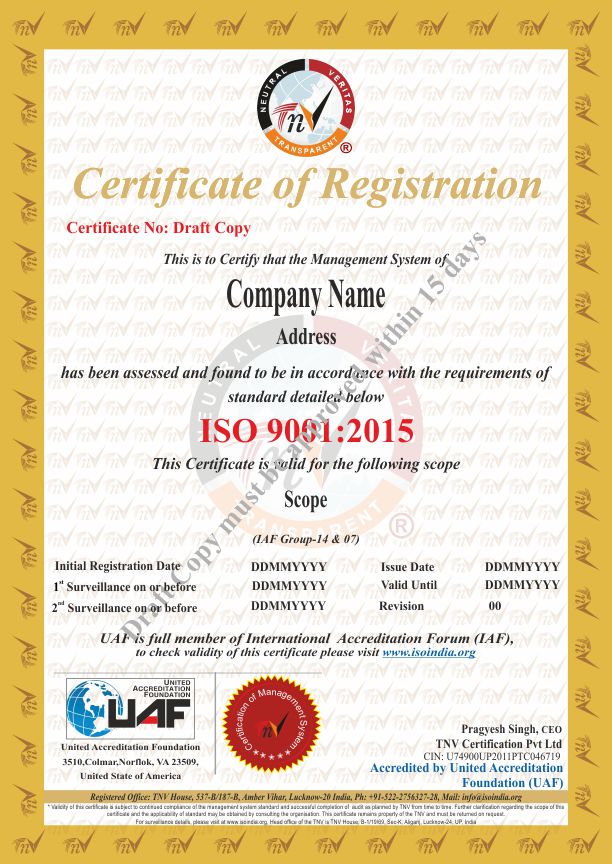
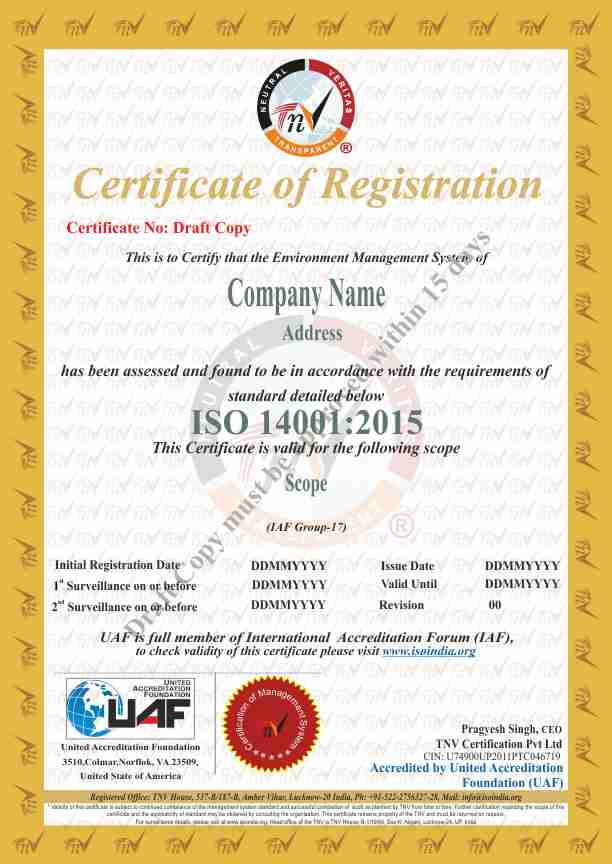
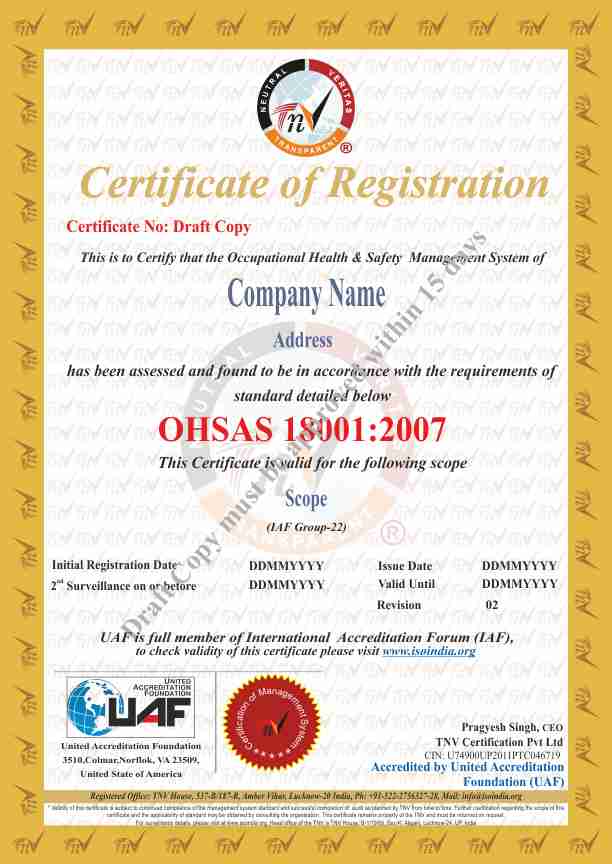
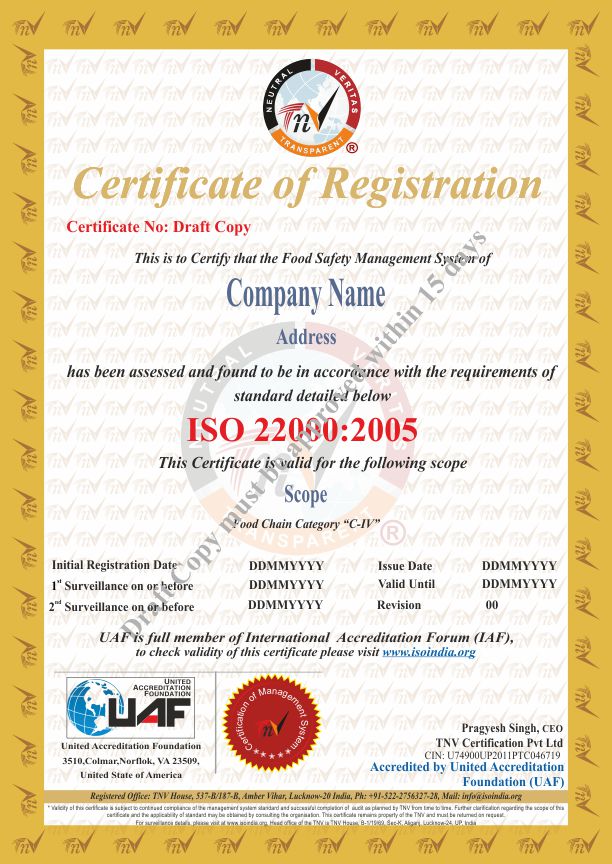
.jpg)
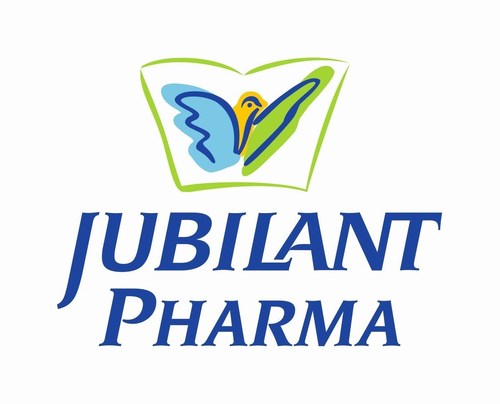 Sanjeev Sharma
Sanjeev Sharma
We are Certified by TNV since last 6 years and we are absolutely happy and satisfied with the systematic approach of the Team. Best Wishes.
»
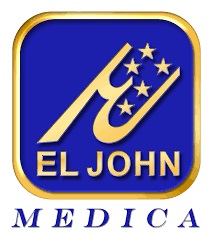 PT. Sun Health Care
PT. Sun Health Care
As always it was an excellent input that we got from TNV, looking forward to continuing a relationship with them. The assessment was very much a structured approach. Our team learned a lot Ari Rahmawati Director of PT Sun Health Care (El John Medica) »
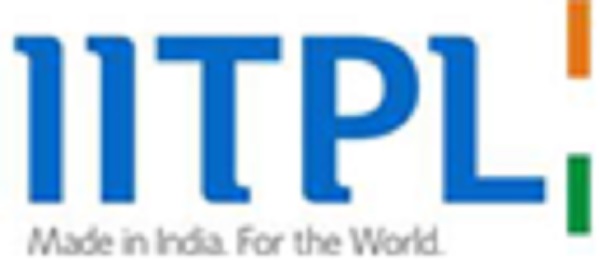 Innovation Imaging Technologies Pvt. Ltd
Innovation Imaging Technologies Pvt. Ltd
"May I take this opportunity to thank you for all your help in the arrangements and organisation for the Training of MD QMS Lead Auditor Certification Course attended. The course was very informative and structured to our requirements. I feel that the relationship that has been b »
 SSP Tech Consultancy Malaysia
SSP Tech Consultancy Malaysia
SSP Tech Consultancy Malaysia is so proud on the long lasting relationship with TNV Certification PVT LTD.
We have been working with TNV since 2010 and there were more than 80 clients have been certified in the field of ISO9001 , ISO14001, ISO45001 & ISO 13485.
We thank you For »
 Maria P. Belyanchikova
Maria P. Belyanchikova
Dear Sir,
We kindly express gratitude for your
outstanding service and long-lasting
cooperation.
Since 2014 our companies in Russia, Moscow,
and United Arad Emirates, Dubai, have several
times ordered certification, surveillance and
audit from TNV Certification Pvt LTD and »
 Unnikrishnan Narayanan Namboodiri
Unnikrishnan Narayanan Namboodiri
Dear Sir,
It is with great pleasure that we at Inspirit Safety Solutions Pvt Ltd, are conveying our gratitude and appreciation to TNV Certification Pvt Ltd for providing the best of services in the domain of
Management System trainings and certifications by accepting us as an a »

I have developed a great relationship with TNV Certification Pvt LTD.
I have undergone a few trainings with TNV training team & have
found their approach to be a highly professional & committed to
providing quality trainings & certifications. I am glad that I also have
had th »







